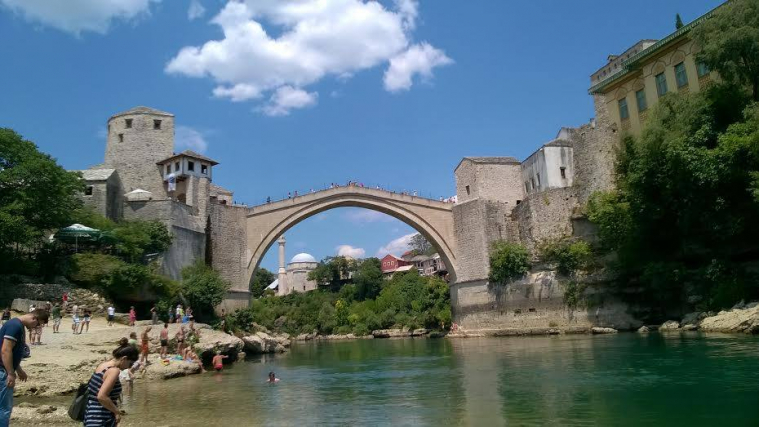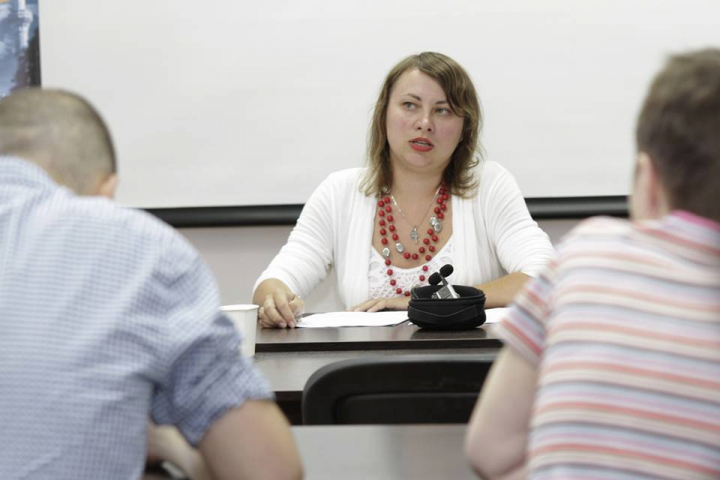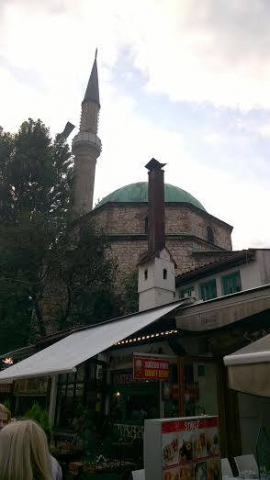During the V Youth International School For Islamic Studies which lasted for a week at the National University "Ostroh Academy", a lot of already well-known scientists and their young colleagues presented their informative reports.
Among them is Ph.D. in international relations, associate professor of Department of Arabic studies at Interregional Academy of Personnel Management (IAPM) Oleksandra Oliinyk. The scholar examined the phenomenon of Islam in Bosnia and Herzegovina in historical context, and disclosed the role of religion as a key factor in the formation of national identity of Slavic Muslims. The report also focused on the current state of Islam in this country.
Here are some fragments of the report (full text of which will be published in the next issue of the digest “Al-Qalam”) with some reductions:
The mysterious and little known Balkan country Bosnia and Herzegovina appeared on the political map of Europe recently (in 1992). It is of particular interest to us because, like Ukraine, it combines Slavic and Turkic, Islamic and Christian origins.
The former Socialist Republic of Yugoslavia, now independent state, Federation of Bosnia and Herzegovina, is the second European country after Albania, where the majority of the local population (half or more) traditionally are Muslims. And it is the only country in the world in which one of the titular ethnic groups are Muslim Slavs. Mass adoption of Islam by the local population is one of the most important events in the history of Bosnia and Herzegovina, which led to the creation of a Bosnian Muslim identity and profiled the Bosnian nation.
Several generations of historians have been trying to explain the conversion. Muslim writers explained the spread of Islam in an idyllic context of stability, prosperity, humanity and durability of Ottoman Empire. According to this view, the adoption of Islam was carried out without any pressure, with a focus on social and religious consciousness of communities and performed as a blessing and grace for those who were following the right way. However, some Christian writers have a different point of view.
Islam had begun to spread in Bosnia before it fell under the influence of the Ottoman Empire, which power increased during the reigns of Sultan Mehmed I (1413-1421 gg.), Selim I (1512-1520 years) Suleiman the Magnificent (1520-1566) when the Ottoman Empire was at the height of its prosperity.
There is also a stereotype view according to which Balkan peoples converted to Islam only under pressure from the Turkish authorities. For example, it is said they did that to escape the tax which was obligatory for all non-Muslim peoples of the Sublime Porte. However, this approach doesn’t fully explain the fact that Islam was retained even after the fall of the last Muslim caliphate. Obviously that specified local people's spiritual culture has led to adaptation to Islam.
One of the probable causes of mass adoption of Islam in medieval Bosnia was the fact that the bogomils suffered from extreme harassment and persecution by the Bosnian king and clergy during those times. It forced them to seek protection of Ottoman Empire. They had many points of intersection between their religion and Islam. For example, they rejected the worship of Mary, the institution of baptism and all kinds of the clergy. They considered that icons, statues and images of saints and relics were idolatry. Their churches were modest and simple. They turned down the church bells. Like Muslims believed that Jesus was not crucified. They didn’t drink alcohol and sought to certain asceticism, praying five times a day. They often kneeled to express thanks to God. Therefore, we can say that the ideas of Islam were organic for them.
129 years passed between the creation Bosnian (1463) and Bihać Sanjaks (1592). The population of Bosnia was turning into Islam gradually. The adoption also was increasing in Herzegovina. The extant records of the monks dated 1509 show that many Orthodox Christians willingly accepted Islam, because of poor church organization, a large number of Bogomils and crypto-Bogomils on that territory, and the impact of cities in other parts of Bosnia.
What else could explain the mass adoption of Islam?
The adoption of Islam provided a better status in society, opened opportunities for promotion and education. Many Bosnians held leadership posts in the Ottoman administration, the army and so on. A striking example is Sokollu Mehmed Pasha.
All serious researchers of this phenomenon have rejected the theory of forced conversion to Islam of Bosnian population. As a result of studying of primary sources, a lot of modern historiographers consider that adoption of Islam by population was difficult, non-violent and prolonged, due to a number of reasons. Also they rejected the theory that nobility converted to Islam only in order to preserve their property.
The Muslim majority had been forming for more than 150 years (up to the first half of the XVII century). Without a doubt, the principles of mass conversion to Islam in Bosnia should be found in a particular religious situation before the Ottoman period.
Historically, Bosnian Slav Muslims didn’t have their own full-fledged statehood until the early 1990s. Immediately after the World War I and the fall of the Austrian Empire, Muslim Bosnians were a part of Kingdom of Serbs, Croats and Slovenes under severe pressure from Serbian nationalism.
Almost half a century of communist rule led to significant secularization of the Muslim population of Bosnia and Herzegovina. Before the war of the 1990s, about 10% of the population considered themselves atheists, agnostics or "deists." The majority of Muslims didn’t do more than visiting the mosque on the major holidays and performing such rituals as circumcision, naming of babies, weddings and funerals.
According to various estimates, in the current independent Bosnia-Herzegovina, the number of Muslims varies from 58% (UNDP data for 2002) to 40% (data CIA) of the total number of population 4.5 million people.
Bosnia and Herzegovina is a secular state without state religion. The state has defined its relations with churches and religious organisations by the law "Freedom of religion and legal status of churches and religious organisations in Bosnia and Herzegovina", which was passed in 2004. This law provides for freedom of religion, approves the legal status of churches and religious communities and establishes relationships between the state and religious communities. In 2006 the Catholic Church in 2008 and the Serbian Orthodox Church signed a basic agreement with the state, while the Islamic Community of Bosnia and Herzegovina only prepared to sign the similar agreement.
The main Muslim organisation is the Islamic Community of Bosnia and Herzegovina (ICBH, Islamska zajednica u Bosni I Hercegovini, Zelenih beretki; www.rijaset.ba). It is independent in regulation of their activity (rituals, Islamic education, distribution of Islamic donations, publishing, charity and so on). It can administer its property and it is funded primarily through membership fees, zakat and others.
Along with the ICBH, there are also relatively small missionary, cultural, academic, student, women's organisations in the country. The largest Muslim charity is a charitable society "Merhamet» (Muslimansko dobrotvorno drustvo «Merhamet», Muslim Charitable Society «Merhamet»), established in 1913. Also it should be mentioned two women's organisations: Educational Women's Centre "Nahla» (Zenski edukacioni centar «Nahla»; www.nahla.ba), Educational Women's Organisation «Kewser» (Zenska edukaciona organizacija «Kewser»; www.kewser-zehra.com. ba).
Most Muslim Bosnians are Sunnis. Historically, Sufi tariqa played an important role in the country. There is also a Shiite community and Bektashi brotherhood, the doctrine and the practice of which strayed from traditional Islam. The country has seven local Muftis. The Grand Mufti is Dr. Mustafa Tserych.
Of course, Islam for Bosnians first of all is a feature of their national identity. As the peoples of the former Yugoslavia as Serbs, Croats and Bosnians differ from each other only by their religions: Orthodox, Catholicism and Islam accordingly. Things got tragic and the reason of the war of 1992-1995 was religion. The results of this tragedy are the genocide of 8 thousands of Muslims in Srebrenica, the destruction of mosques Ferhadija and Arnaudija in Banja Luka, listed in UNESCO World Heritage List. It is an open wound in the memory of the Muslims of Bosnia and the whole world. But this war has caused a significant surge of interest in Islam in the country, especially among young people. Today, the tendency shows the interest in Islam is increasing.
Many analysts believe that Bosnia and Herzegovina and its way of preserving tradition and building a modern democratic society can be a certain model for other countries with the majority of Muslim population, such as Albania, Kosovo, Macedonia and Turkey that want to integrate into the EU.




